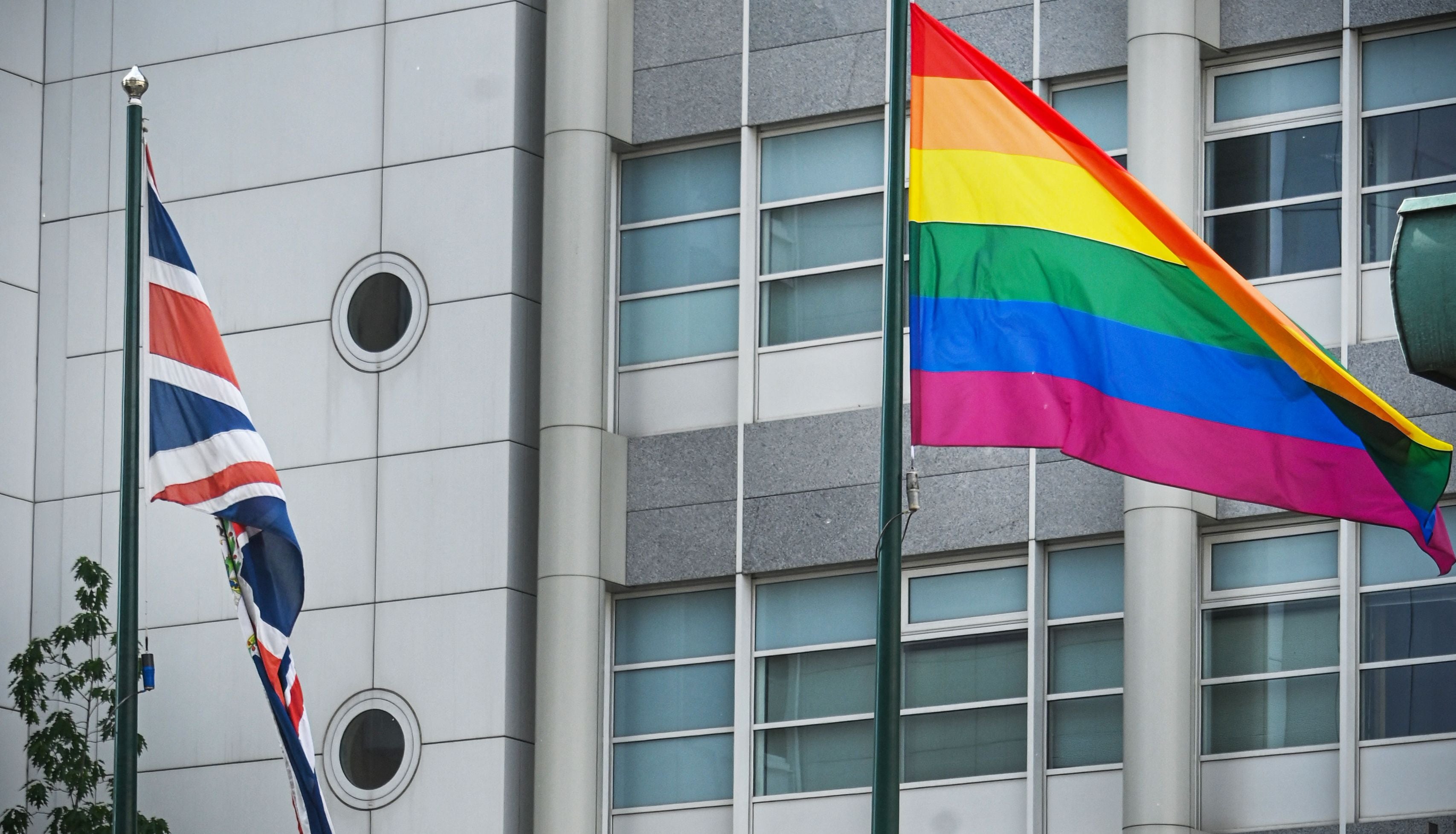British Embassy in UAE faces backlash after flying rainbow flag for Pride
Conservative Emiratis dub the move ‘racist’ and ‘disrespectful’, but analysts say it could be the latest indication that the UAE is about to decriminalise homosexuality

Your support helps us to tell the story
From reproductive rights to climate change to Big Tech, The Independent is on the ground when the story is developing. Whether it's investigating the financials of Elon Musk's pro-Trump PAC or producing our latest documentary, 'The A Word', which shines a light on the American women fighting for reproductive rights, we know how important it is to parse out the facts from the messaging.
At such a critical moment in US history, we need reporters on the ground. Your donation allows us to keep sending journalists to speak to both sides of the story.
The Independent is trusted by Americans across the entire political spectrum. And unlike many other quality news outlets, we choose not to lock Americans out of our reporting and analysis with paywalls. We believe quality journalism should be available to everyone, paid for by those who can afford it.
Your support makes all the difference.The British Embassy in the United Arab Emirates has been met with a backlash online after it hoisted a rainbow flag at its Abu Dhabi residence and spoke out in favour of Pride Month.
Despite its attempts to be seen as a voice of liberal Islam in the Middle East, the UAE still criminalises homosexuality.
So when the British Embassy in the UAE on Monday voiced its support for LGBT+ rights on social media, complete with pictures of a rainbow flag flying from its residence alongside the Union Jack, criticism swiftly followed.
Hundreds of comments from conservative Emiratis decried the move as “unacceptable”, “disrespectful” or “insulting”, while some suggested it was “racist”, and many urged the embassy to remove the flag immediately.
Many spoke of it being against Islam, or an example of the UK attempting to impose their views on another country. One comment likened the move to if a British consulate in the UK “raised a flag of a swastika”. The few who spoke out in favour of the embassy were primarily Western expats.
Despite the overwhelming opposition to the show of support for LGBT+ rights, some Emirati analysts believe the move comes as the UAE prepares to decriminalise homosexuality.
A government source, who asked not to be named, said homosexuality was expected to be decriminalised before the end of the year, potentially before Expo2020 Dubai, which begins in October. He said the government often “drip feeds” potential law changes on social media or in the public domain before they come into effect, to canvas the opinion of locals.
It was also unlikely that such a prominent public entity, one well aware of local laws, would risk falling out of favour with the Emirati government over such a bold move. Embassies, however, are not bound by local laws.
Emirati political scientist Abdulkhaleq Abdulla understood the embassy had sought permission to hoist the flag as a show of solidarity to the LGBT+ community.
“They did inform the Ministry of Foreign Affairs and International Cooperation. They said: ‘Look, we’re doing this because we have a stand on LGBT rights’. I think the answer was: ‘It’s better for you not to do it, but then this is your sovereign right’. So they did not get a green light, but I think they got a yellow light.”
Abdulla labelled the move “bad taste” and one that had deliberately “aggravated people”. However, he said the negativity surrounding it had come from the most conservative members of Emirati society – representing about one third of the overall population.
“Sixty per cent of the people don’t give a damn about it, whether the British put up the flag or not. This has come from the vocal minority rather than from the silent majority,” he said.
The US Embassy also flew a rainbow flag in Abu Dhabi this year, but did not draw the same level of criticism.
Abdulla believed legalising homosexuality “might now be in the pipeline”.
“The UAE is as liberal as any [country] and the government will maybe find the right time to say: ‘Everybody who wants to be homosexual, it’s up to you. I’m not going to sanctify it, marriage-wise, but if you want to practise it, go ahead and be my guest’.”
The UAE’s recent legalisation of cross-dressing was believed to be the first step in a process that would pave the way for LGBT+ rights.
The country quietly amended the laws around cross-dressing late in 2020, amid a raft of momentous legal reforms that decriminalised alcohol, suicide and co-habitation for unmarried couples. It is now only illegal to cross-dress if a man is doing so to gain access to facilities used by women.
“These are big steps, not baby steps,” Abdulla said.
“This is a country that is very revolutionary compared to its surroundings. The things that the UAE has been doing are pioneering and are decisions not to the liking of many countries around us.
“The world is changing, and the emirates of today are not the emirates of yesterday. The UAE must adapt to the transformations.”
The British Embassy in the UAE did not respond to questions.
Join our commenting forum
Join thought-provoking conversations, follow other Independent readers and see their replies
Comments